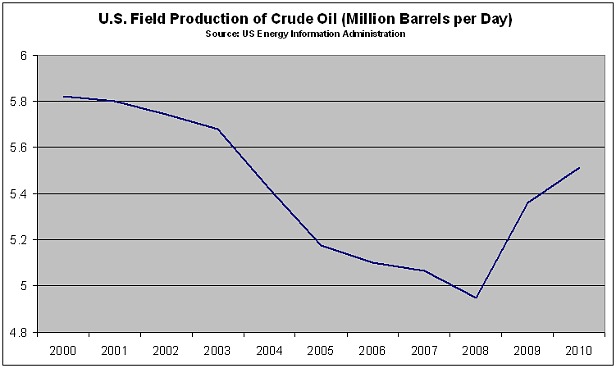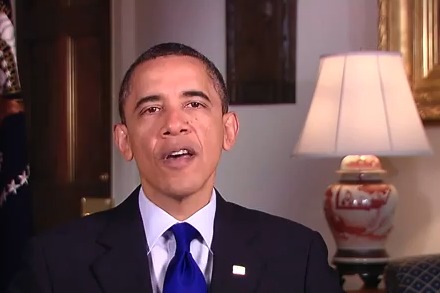One thing we know for certain — more domestic drilling starting now will have exactly the same impact on prices that the increased domestic drilling in the last two years had. Zilch.
The U.S. Energy Information Administration has been making that precise point for years now.

Even the media has started to report on this: “Today, CNN Money tackles the bottom line: What would more domestic oil production do to the price of gas? In short, close to nothing.”
“This drill drill drill thing is tired,” said Tom Kloza, chief oil analyst at the Oil Price Information Service, which calculates gas prices for the motorist organization AAA. “It’s a simplistic way of looking for a solution that doesn’t exist.”
President Obama is more than aware of this — he himself noted, “Last year, America’s oil production reached its highest level since 2003.” And somehow oil prices soared. Yet in his Saturday radio address, he cynically called for more domestic drilling, including in Alaska, which is ill-prepared for a major spill:
Yes, while allowing that “there are no quick fixes to the problem,” the president actually said more domestic oil production was among the “few steps we should take that make good sense.” Sad.
You’d think that an entire address dedicated to drilling, including drilling in the Gulf, might mention the BP oil disaster, at least in passing. You’d be wrong:
I believe that we should expand oil production in America — even as we increase safety and environmental standards.
To do this, I am directing the Department of Interior to conduct annual lease sales in Alaska’s National Petroleum Reserve, while respecting sensitive areas, and to speed up the evaluation of oil and gas resources in the mid and south Atlantic. We plan to lease new areas in the Gulf of Mexico as well, and work to create new incentives for industry to develop their unused leases both on and offshore.
We’re also taking steps to give companies time to meet higher safety standards when it comes to exploration and drilling. That’s why my administration is extending drilling leases in areas of the Gulf that were impacted by the temporary moratorium, as well as certain areas off the coast of Alaska. And to streamline that permitting process, I am establishing a new team to coordinate work on Alaska drilling permits.
Of course, this is not so much a new policy as a reversion to Obama’s pre-BP-disaster policy (or is that “Obama’s pre-BP disastrous policy”). But post-spill, one has to wonder about the need for streamlined permitting in Alaska, which would suffer mightily from any spill with far fewer resources available for cleanup.
For the record, caving on drilling was probably inevitable sooner or later given gasoline prices at this level and peak oil (and the Dems’ general semi-competence at coherent messaging). But it is absurd to explicitly link the drilling to the possibility of lowering prices — as that validates “Drill, Baby, Drill.” He truly is Barack “No Narrative” Obama.
Even worse, Obama is not merely adopting the GOP rhetoric — but getting nothing whatsoever in return for it. Obama says we should “eliminate the taxpayer subsidies we give to oil and gas companies.” Well, if you are planning to cave on drilling, how about at least getting the subsidy elimination as part of the deal?
The address offers three explicit “solutions” — having the attorney general look into market manipulation, more drilling, and cutting subsidies. They solve nothing and don’t include any of the key medium-term solutions, including tougher fuel economy standards and the switch to renewable energy. Obama does mention those at the end:
The American people shouldn’t be subsidizing oil companies at a time when they’re making near-record profits. As a nation, we should be investing in the clean, renewable sources of energy that are the ultimate solution to high-gas prices. That’s why we’re investing in clean energy technology, helping businesses that manufacture solar panels and wind turbines, and making sure that our cars and trucks can go further on a tank of gas — a step that could save families as much as $3,000 at the pump.
These are investments worth making — investments that will save us money, reduce our dependence on foreign oil, and protect the health and safety of our planet. That’s an energy policy for the future, and it’s what I’ll be fighting for in the weeks and months to come.
Notice he doesn’t say we should take the money from the oil companies subsidies and use it to invest in clean energy — because senate Democrats have already decided the messaging is cleaner if all that money goes to deficit reduction rather than clean energy. Whom the messaging gods would destroy, they first make mad.
Will Obama actually fight to stop the deep cuts in clean energy that the Republicans will insist on to raise the debt ceiling? We’ll see. Maybe the deal Obama should have offered is more drilling in return for not cutting clean energy. But that would require a strategy and a narrative.
Finally, “protect the health and safety of our planet” is the wrong message, even (optimistically) assuming that Obama is making some glancing reference to the environmental-problem-that-must-not-be-named.
Protecting the planet isn’t what most people care about. Protecting the health and safety of our children — now that’s something everyone can get behind. Of course, it’s not clear how you can protect the health and safety of our kids or our planet by drilling for more oil.
Bad messaging. Cynical policy. Tastes filling. Less great. Take your pick.



